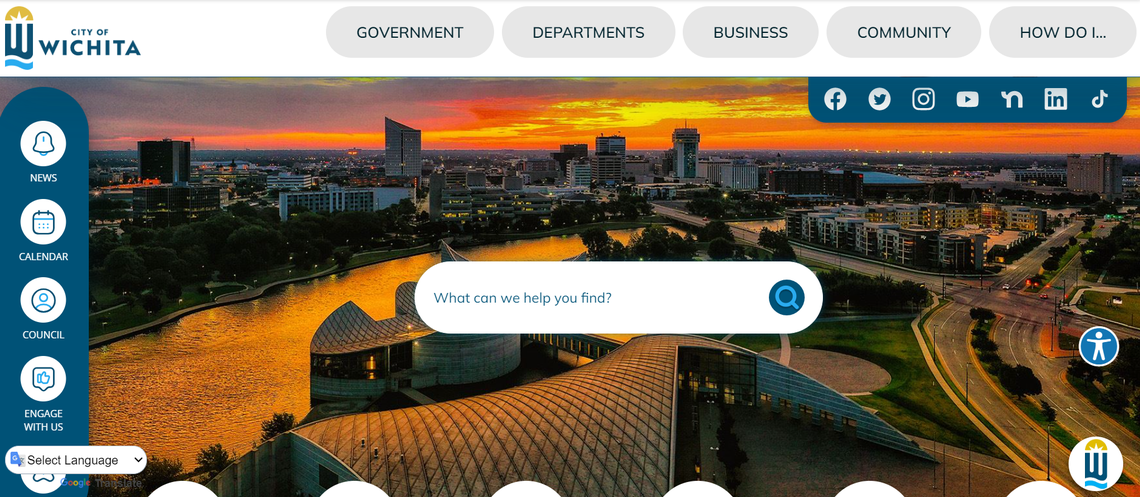City names its website Wichita’s official newspaper but will still use print, too

The Wichita City Council has voted to name its own website, Wichita.gov, the city’s official newspaper for the publication of legal notices. But it will also continue to publish the notices in print.
City Council member Becky Tuttle introduced an amendment Tuesday to preserve the practice of publishing copies of ordinances and notices of official actions in a third-party publication.
“I’ve said consistently since the first time this item was brought to us that I’m not willing to sacrifice transparency for cost-savings,” Tuttle said. “I understand that we have looming budget shortfalls in ‘26, ‘27, ‘28, but I also think it is our responsibility to be transparent.”
Her amendment states that in addition to publishing notices on the city site, they must also be published in a “secondary print source.”
“It would go out for [request for proposal] and so we then would be utilizing the free market to determine what the best service would be for this,” Tuttle said.
The city currently pays McClatchy, The Eagle’s parent company, roughly $150,000 a year to publish legal notices, accounting for about .02% of the city’s annual budget. The Eagle publishes the notices in print and online. That contract will be rebid after it expires on Aug. 31.
The publication of legal notices in a designated newspaper is required by state law.
The 5-2 vote caps off a monthslong effort spearheaded by council member Dalton Glasscock to terminate the third-party publishing contract as a cost-saving measure, relying on Attorney General Kris Kobach’s opinion that cities can stop publishing legal ads in newspapers by passing a charter ordinance.
In April, the council chose to delay a vote on naming Wichita.gov the city’s paper of record until after the proposal could be presented to each district advisory board. A month later, the government’s computer network was shut down after hackers encrypted certain city systems with malware and demanded payment.
“Following the LockBit ransomware attack and the loss of citizens’ personal information, the security breach has eroded public trust in the city and the city’s ability to effectively disseminate public information, including public and legal notices,” Susie Cunningham said during public comment.
Tuttle said that’s one reason why legal notices, including information about imposing taxes, creating benefit districts and amending the zoning code, should not appear only on the city website.
“I understand that our website was not shut down during the cyber attack, but people thought it was or they were worried about going to it because then it could somehow impact them,” Tuttle said.
“What this motion would do is, the city’s website would be utilized as the official source, but we also have to have another source so in case we ever did, heaven forbid, have another cyber attack and our website did go down and wasn’t functional, we would have redundancy.”
Glasscock said he agreed with Tuttle’s logic and seconded her amendment to the charter ordinance proposal. After the meeting, he elaborated on why.
“Council woman Tuttle’s amendment allowed for a more competitive bid process in seeking a print media source to supplement the city’s website as the official record,” Glasscock said. “Good governance is about compromise and this compromise will allow the city to see a potential cost savings through a competitive and free-market bid process which offers more transparency than the previous charter ordinance.”
Even if the official newspaper ordinance moved forward without Tuttle’s amendment, the city still would have had to re-bid its legal publication contract to account for certain legal notices — including public hearings for the annual budget, city land acquisition and eminent domain hearings — that must be published in “a newspaper of general circulation” under state law.
“Occasionally our state Legislature gets something right. Maybe not as often as we would hope, but they did hold our feet to the fire as far as what actually qualifies as a newspaper,” said Mike Hoheisel, who voted against naming Wichita.gov the official newspaper.
He said the debate around legal notices has not been a particularly productive one.
“I do appreciate the changes that have been worked on up here. I think it does help with the transparency issue quite a bit. This is just a little too quick for me,” Hoheisel said.
The only other member to vote against the charter ordinance was Vice Mayor Maggie Ballard.
“Legal notices are not for community engagement. They are about publishing an independent record that is maintained in all libraries of Congress for future legal use,” Ballard said. “The website does not accomplish that, and for that, I’ll be voting no.”
Emily Bradbury, executive director of the Kansas Press Association, said any alternative publication model for legal notices would sacrifice transparency.
“When significant decisions are made about how to spend tax dollars or zone a property, notices about these actions must be verified and published by an independent third-party. If not, it’s the fox guarding the hen house,” Bradbury said. “Second, a printed newspaper cannot be hacked. Printed notices are verifiable.”
The Eagle publishes legal notices both in print and online, and they can also be found through the KPA’s website at kansaspublicnotices.com.

